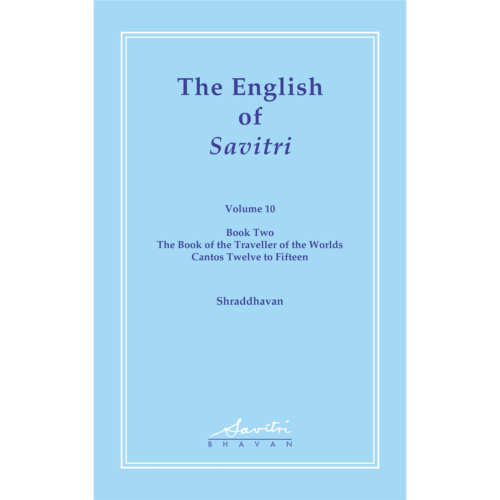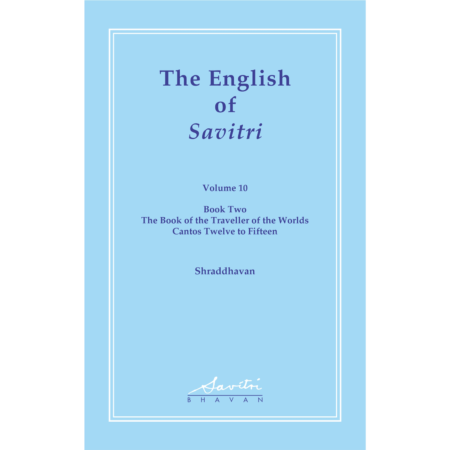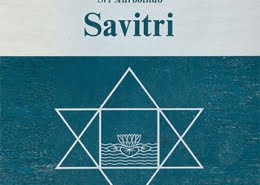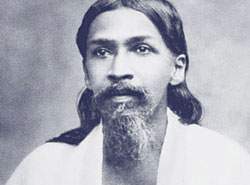The English of Savitri Volume 10

The English of Savitri
volume 10
Author: Shraddhavan
Print Length: 178 pages
Publisher: Savitri Bhavan
Book format: PDF, ePub, Kindle
Language: English
Book Download
Table of Contents
Introduction
Canto Twelve. The Heavens of the Ideal
Canto Thirteen. In the Self of Mind
Canto Fourteen. The World-Soul
- Section 1 : lines 1-100
- Section 2 : lines 101-148
- Section 3 : lines 149-258
Canto Fifteen. The Kingdoms of the Greater Knowledge
- Section 1 : lines 1-139
- Section 2 : lines 140-187
Book Sample
The English of Savitri
volume 10
The Heavens of the Ideal
We have been following King Aswapati, who is going to become the human father of Savitri, in his journey through all the subtle worlds that correspond to the different planes of our consciousness. The great mystics and teachers and seers through the ages have known about the existence of these worlds but, so far as I know, nobody has ever described in such detail the worlds and the beings who inhabit those worlds and those different levels of consciousness. It is something very, very special that Sri Aurobindo has done for us.
Aswapati started his quest from the subtle plane closest to our own, The Kingdom of Subtle Matter. What we see and experience here in our world is based on solid, gross matter, but there is a subtle-physical kind of matter, with which we can come into contact with some effort. Aswapati then moved on into the worlds of life. There are many different life levels, and we read about the evolution of Life: the planes that have been created in the evolutionary process as Life develops in matter. Finally he enters the life-heavens or pure life planes, which are not touched by matter at all. Then he comes to the mind planes, and first of all, The Kingdoms of the Little Mind, the lesser mind that corresponds to the levels of mind which we humans work with: the physical mind, the vital mind, the reason. Then above that, the poet showed us two yet higher levels of mind that human beings have access to: a higher ‘Life-Thought’ and ‘A pure Thought-Mind’. Further he ventured into higher mind levels that we do not normally have access to at all. These pre-exist the evolutionary process. They have determined the creation of matter. Sri Aurobindo described to us how all that has happened. Then he told us that this is the ‘play’, the bright ‘play’ of the ‘Kings of Thought’, who are acting as intermediaries between the highest divine creative level and here, the material creation. Now he will lead us to the next higher level which he characterises as ‘The Heavens of the Ideal’. From the beginning of Canto Three of Book One of the poem King Aswapati has been described to us as ‘A thinker and toiler in the ideal’s air’. It is as if there is a mind level where ideal forms of things are given or exist. This is a short but very beautiful canto, in which the poet describes two different kinds of ideals which have influenced human development, introducing us to ‘The Kingdoms of the deathless Rose’ and ‘The Kingdoms of the deathless Flame’, before moving on to even higher realms of consciousness.
Always the Ideal beckoned from afar.
Awakened by the touch of the Unseen,
Deserting the boundary of things achieved,
Aspired the strong discoverer, tireless Thought,
Revealing at each step a luminous world.
‘The Ideal’ – what should be, the way things should be – is somehow guiding us like a star. King Aswapati feels that this ‘Ideal’ – the true, real, way things should be – is beckoning to him, inviting him ‘from afar’, from a great distance, and revealing even further realms to be explored.
Q: What does the word ‘beckoned’ mean?
Beckoning is when you make a little gesture with your hand, inviting someone or something to approach you closer, “Come”.
Aswapati feels the call, the invitation, of the ‘Ideal’. The power of ‘Thought’ in him has been ‘Awakened by the touch’ of what has not yet been seen, ‘the Unseen’. So it deserts or abandons, it leaves behind it, ‘the boundary’, the frontier, ‘of things’ that have already been done and ‘achieved’. It wants to move forward to new things that have not yet been done. That ‘strong discoverer’, his ‘tireless Thought’ is aspiring, yearning to go higher and higher, and as it does so, ‘at each step’ it reveals a new ‘luminous world’, for there is a whole succession of higher worlds still to be discovered.





Leave a Reply
Want to join the discussion?Feel free to contribute!